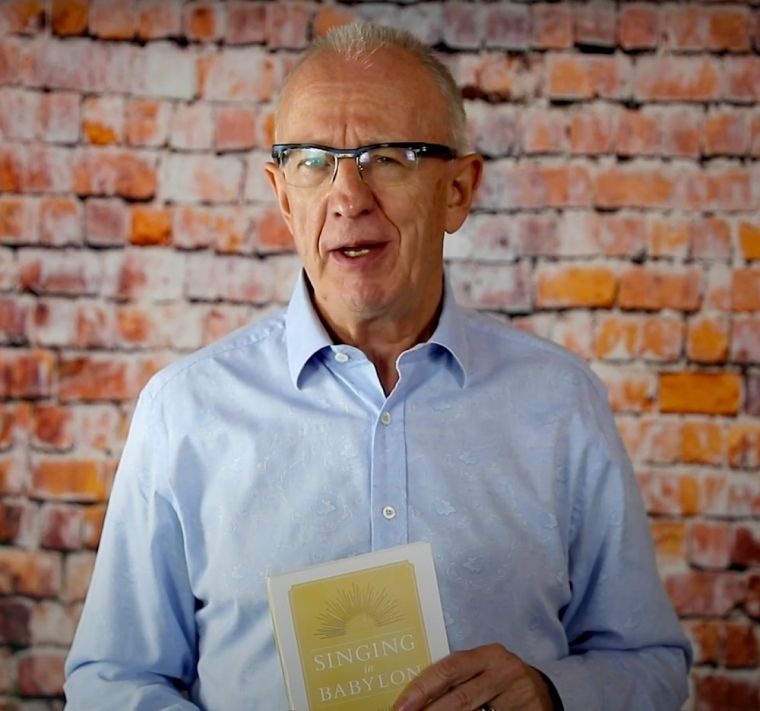Jeff Lucas on how to thrive when life doesn't turn out as planned

Hardships and lockdowns may not be what most of us would choose, but popular author and speaker Jeff Lucas wants to remind Christians that these are the very places where we can find both purpose and meaning.
In his new book, "Singing in Babylon: Finding Purpose in Life's Second Choices", Jeff takes inspiration from Daniel and his life in exile in Babylon to show that, in his faithfulness to God, he was able to thrive in this most unlikely of settings.
Fittingly, the book has been chosen for the second Big Church Read getting underway across the UK on 17 February.
Jeff speaks to Christian Today about how he has learned to thrive in those places of disappointment and why he thinks a certain level of disillusionment is healthy in life.
CT: The book seems very timely. Was it in incubation before the pandemic started or is it a response?
Jeff: It was a couple of years before the pandemic was even on the horizon that I started planning this book. The subtitle is 'Finding Purpose in Life's Second Choices' and everyone's living in a second choice world at the moment with all the constrictions and fears we're facing. So yes, it does seem really timely but I can't take any credit for a quick response because it was already in the timeline!
CT: Have you found living out this 'second choice' life challenging?
Jeff: At a trivial level we all experience our first and second choices every day, and there have definitely been seasons in my life - whether it's concerns about family sickness or other challenges that I've navigated as a church leader - where it's definitely felt like my second choice!
The message of the book is not to be glib, as if to say, 'oh, I'm so thrilled I'm in my second choice.' That's not what I'm suggesting. But when we look at people in the Bible like Daniel, he was led off to exile somewhere between the age of 12 and 18, when he was very young, and he came from a privileged background. He had to live in Babylon, a city he didn't want to be living in and so he essentially spent his whole life in a lockdown of sorts. But ultimately he thrived in this place and there are lessons for us there.
What I've come to appreciate is that much of the Bible has been written by people who were in lockdown, whether that's Joseph who spent time in prison, or the Apostle Paul who likewise wrote his prison epistles while in the lockdown of house arrest.
When people say 'where's God gone now?', I understand that kind of questioning because we do believe in an interventionist God, and yet much of the Bible was written by people who were experiencing very severe restrictions.
CT: Do you think the pandemic might have been a shake-up for Christians in the West where we have been used to a very kind of 'comfy' Christianity?
Jeff: I'm hoping the Church doesn't go back to normal because what many churches have demonstrated is that we can do things differently and we can be flexible. For all of us, change and flexibility can be a challenge, but I really do hope we can come out from this shaken up with the reality that we need to take responsibility for ourselves.
Because when everything was normal, it was possible just to show up at church, sing a couple of songs, work our way through the service and be spoon-fed some information. I think that this kind of casual approach to faith won't survive this challenge. The pandemic has demanded that we put down spiritual roots ourselves.

And I also think it gives us the opportunity to think through what messages we tell young people. One of my grandsons was told at high school recently that 'if you can dream it, you can do it', and it's really not true! Because there are probably 100,000 young boys out there who want to play for Chelsea and not many of them are going to do that!
And I wonder if, at a serious level, we are guilty of setting young people up for a first choice world, and in the Church of setting young people up to believe that if they just stay faithful to God, write the cheque and put it in the plate, and read the Bible - preferably Leviticus - first thing in the morning, that they're going to get a first choice world. Because again and again, the Bible is just filled with second choice stories.
Ultimately, I believe that God is the redeemer of that which He is not the architect of. Personally I don't take the view that God sent the pandemic, but I do take the view that coming out of the pandemic we can be truly shaken up and be more mature in our faith as a result.
CT: There seem to be so many churches out there giving people the idea that if they convert to Christianity and have enough faith, that they're going to have the dream life and abundance.
Jeff: The prosperity gospel message is a bunch of tosh and it's about time that we grew up and realised that even a cursory glance through the Bible shows us that any expectation of the dream life is just not grounded in truth. Sadly, some of this stuff is very directly linked with people giving money to those who hawk that kind of message and tell them that they are going to be blessed as a result.
We really need to say that this is not the Gospel. Yes, God does want to bless us in a variety of ways, but it's an insult to the Church in the Two-Thirds World to suggest that Jesus is the pathway to the dream life - and it's an insult to Scripture. Just read Daniel's story. He was blessed with power and the king of Babylon gave him gifts, but to somehow suggest that this is a paradigm of expectation for every Christian is just a lie.
CT: Coming down to the individual level, when disappointment comes and something didn't work out how we wanted it to, that can be a huge blow and we can struggle with the question of why God didn't intervene and make things turn out different. Do you have any answer for someone who may be asking the question of 'why did God allow me to go through something like this?'
Jeff: The question of 'why?' is a massive one and in trying to answer it, we could all too easily just end up with simplistic slogans. I do think that we need to be healthily disillusioned. I used to view disillusionment as an enemy because it normally leads to cynicism. But when you're disillusioned about something, you're divested of an illusion and so you can start to face reality as it actually is. So whether it's about church - which is not full of perfect people - or marriage or friendship and faith, we need to be healthily disillusioned and have a view of the Kingdom that recognises it is not the same as the 'Magic Kingdom'.
The story in Daniel with Shadrach, Meshach, and Abednego in the fiery furnace is an incredible statement in this respect because they were facing this super-heated furnace and the king had already burned two Jewish rebels alive (Jeremiah 29), so this was not an idol threat. Yet faced with the prospect of that kind of suffering, they said that God was able to deliver them - the Hebrew actually says 'infinitely able'. And they went even further than that and said that even if He didn't, they still weren't going to bow the knee.
We see the tension of faith, that on the one hand has this utter conviction that the God who spoke the universe into being with the Word can actually intervene and change everything, while on the other hand saying that even if He doesn't do that, we're still not going to abandon our loyalty to Him. I've seen that modelled as a pastor countless times with people navigating long-term disabilities. They utterly believe God can heal them but they've also expressed the conviction that they will not gamble their faith on a particular outcome.
It seems to me that whenever we're asking God to do something, we should have that posture. And that is not a lack of faith! Some of the people who teach the faith-prosperity stuff say that we should never pray 'if it be Your will' prayers and that we should be more demanding that. But that's really interesting because Jesus in Gethsemane said, "Not my will but Yours be done." So it's about submitting ourselves and saying 'God, I really believe You can do this but whatever You choose to do, I will trust You anyway'. The people who can say that in the face of great difficulties are the real heroes we should be celebrating.
CT: In today's social media world, it could be quite easy to look at someone's glamorous Instagram feed and think that they got the first choice life!
Jeff: I think when we're looking at Facebook and possibly salivating over pictures of someone else's breakfast - which there's a lot of on there! - we need to remember that we're getting the headlines but not the backstory. And that goes beyond social media, to our platforms and pulpits too. Often preachers share the headlines but don't tell the backstory.
Last weekend I talked about a remarkable dream I had 20 years ago that unlocked something in someone else's life that really was quite remarkable. I could easily give the impression that this sort of thing happens to me every day but the truth is that God has not been as chatty as I thought He would be through the years!
So, we can help ourselves by realising that often what we see on social media and even hear on platforms are the headlines rather than small print or backstory, and that we therefore should not compare our lives with others because the comparison is not true. All we're seeing is the highlights.











